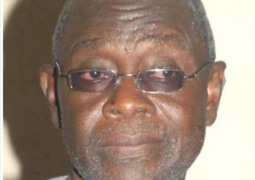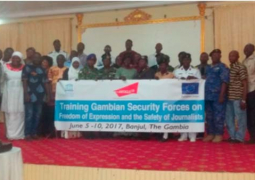The other accused persons are Hamidou Jallow, Principal Lands and Evaluation Officer at the ministry of Lands and Surveys and Tamsir Oness Conteh, a local businessman.
The ruling followed an objection raised by the state prosecutor, Abdouraham Bah because the document sought to be tendered by the defence counsel, was a public document and that it was not the original copy.
In his ruling, Magistrate Dawda Jallow, told the court that during the proceedings of Wednesday 19 November 2014, the defence counsel sought to tender a copy of the first letter of compensation which the 1st accused person said he received from the ministry of lands.
He said the state counsel objected to the admissibility of the document on the grounds that it was not a certified true copy as required for public documents, citing the Evidence Act to support his objection.
In response, defence counsel, submitted that secondary evidence is admissible under the Evidence Act, noting that the document is not a public document even whereas a public institution issued it because it was addressed to the first accused, and as such it is his private document.
He said there is no contention that the document sought to be tendered is a copy of a letter referenced SL/44/2005/(5) dated 13 June 2005 and issued by the department of lands and surveys to the first accused person herein.
He said according to the definition of public documents provided underthe Evidence Act 1994’ documents forming the acts or records of the acts of official bodies are public documents.
He said the department of lands and surveys is indeed an official body and in that regard I have no doubt in my mind that this letter having been addressed to a private citizen does not make any difference.
“I am now to consider whether or not the document, having been held to be a public document and of a secondary nature, is admissibile under the rules of Evidence Act,’’ he said.
“Secondary evidence may be given of the existence, condition or contents of a document when the original has been destroyed or lost and in the latter case all possible search has been made for it,” he added.
He said a further perusal of the Evidence Act reveals that this provision is limited to cases other than public documents and this is clearly stated under section 101 (2) (C) of the Evidence Act.
He said the secondary evidence admissible in respect of the original documents referred to in subsection(1), in paragraph (e) or (f), a certified copy of the document, but no other kind of secondary evidence, is admissible.
He said in light of the general rule of relevance under s.3 of Evidence Act the letter was hereby rejected.
The case was adjourned to 4 December 2014.



